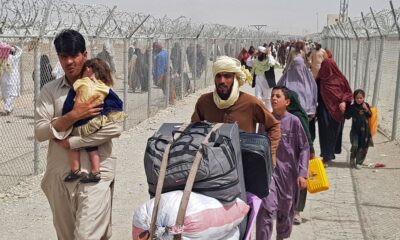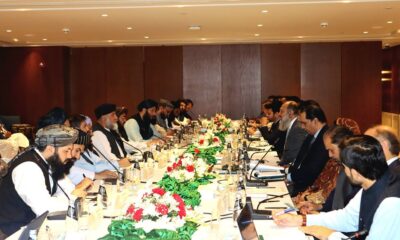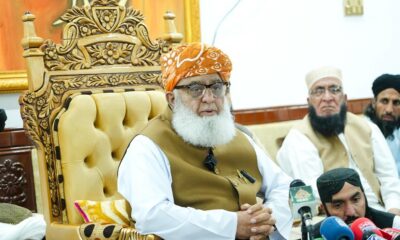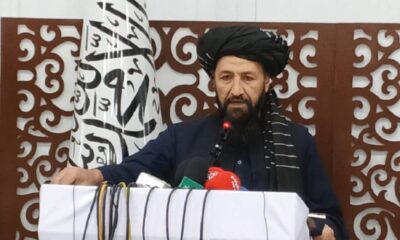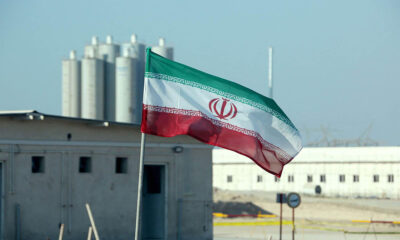World
Israel bombards Gaza, Lebanon as Netanyahu convenes war cabinet

Israel bombarded Gaza with air strikes early on Monday and its aircraft struck southern Lebanon overnight, as Israeli Prime Minister Benjamin Netanyahu convened a meeting of his top generals and his war cabinet to assess the escalating conflict.
Israel’s attacks concentrated on the Gaza Strip’s center and north, Palestinian media reported. A strike on a house near the Jabalia refugee camp, in northern Gaza, killed several Palestinians and wounded others, according to media reports.
In the Israeli-occupied West Bank, two Palestinians were killed at the Jalazone refugee camp near Ramallah, the Palestinian health ministry said on Monday.
Residents told Reuters that Israeli forces raided the camp and carried out widespread arrests, as they clashed with gunmen and some youths who threw stones. The Israeli army has not issued a statement about the incident.
Health authorities in Gaza said at least 4,600 people were killed in Israel’s two-week bombardment that began after a Hamas Oct. 7 rampage on southern Israeli communities in which 1,400 people were killed and 212 were taken into Gaza as hostages.
Palestinian Hamas leader Ismail Haniyeh and Iranian Foreign Minister Hossein Amirabdollahian discussed in a call late on Sunday the means of stopping Israel’s “brutal crimes” in Gaza, Hamas said in a statement.
Israel has amassed tanks and troops near the fenced border around Gaza for a planned ground invasion aiming to annihilate Hamas.
Fears that the Israel-Hamas war could mushroom into a wider Middle East conflict rose over the weekend with Washington warning of a significant risk to U.S. interests in the region and announcing a new deployment of advanced air defenses.
The Pentagon has already dispatched a significant amount of naval power to the Middle East, including two aircraft carriers, support ships and about 2,000 Marines, to help deter attacks by Iran-affiliated forces.
“What we’re seeing … is the prospect of a significant escalation of attacks on our troops and our people throughout the region,” U.S. Defense Secretary Lloyd Austin told ABC’s “This Week” program on Sunday.
China’s Middle East special envoy Zhai Jun, who is visiting the region, warned that the risk of a large-scale ground conflict was rising and that spillover conflicts in the region were “worrisome”, Chinese state media said on Monday.
Iranian security officials told Reuters Iran’s strategy was for Middle East proxies like Hezbollah to pursue limited strikes on Israeli and U.S. targets but to avoid a major escalation that would draw in Tehran, a high-wire act for the Islamic Republic.
In neighboring Syria, where Hamas’ main regional backer Iran has a military presence, Israeli missiles hit Damascus and Aleppo international airports early on Sunday, putting both out of service and killing two workers, Syrian state media said.
Along Israel’s northern border with Lebanon, the Iran-backed Hezbollah group has clashed with Israeli forces in support of Hamas in the deadliest escalation of frontier violence since an Israel-Hezbollah war in 2006.
Early on Monday, Israeli aircraft struck two Hezbollah cells in Lebanon that were planning to launch anti-tank missiles and rockets toward Israel, its military said. Israel’s military also said it struck other Hezbollah targets, including a compound and an observation post.
Hezbollah said on Monday that one of its fighters was killed, without providing details. Israel’s military said 7 troops have been killed on the Lebanese border since the latest conflict began, Reuters reported.
With violence around its heavily guarded borders increasing, Israel on Sunday added 14 communities close to Lebanon and Syria to its evacuation contingency plan in the north of the country.
Palestinian Prime Minister Mohammad Shtayyeh called on the international community to create “a united front” to stop Israel’s attacks in Gaza and allow desperately needed aid which has only begun to trickle in.
A second convoy of 14 aid trucks entered the Rafah crossing to the besieged Gaza Strip on Sunday night, and U.S. President Joe Biden and Netanyahu affirmed in a call “there will now be continued flow of this critical assistance into Gaza”, the White House said.
The U.N. humanitarian office said the volume of aid entering so far was just 4% of the daily average before the hostilities and a fraction of what was needed with food, water, medicines and fuel stocks running out.
World
Trump holds Situation Room meeting on Iran, officials say
Trump has threatened military action against Iran if it does not give up its nuclear program while also stressing the need for diplomacy and negotiations.

President Donald Trump met with his top national security aides on Tuesday to discuss Iran’s nuclear program ahead of a second meeting between U.S. and Iranian officials on Saturday, sources said.
U.S. special envoy Steve Witkoff is to meet his Iranian counterpart on Saturday, a session currently scheduled to be held in Oman. Trump spoke to the sultan of Oman, Haitham bin Tariq, about Oman’s mediation role between Washington and Tehran.
A White House official confirmed the White House Situation Room meeting on Iran and said the location was not unusual since Trump gets briefed there regularly to take advantage of the chamber’s secure setting.
A second source briefed on the meeting said Trump and his top aides discussed the Iran talks and next steps. U.S. officials have been working on a framework for a potential nuclear deal.
Trump has threatened military action against Iran if it does not give up its nuclear program while also stressing the need for diplomacy and negotiations.
White House press secretary Karoline Leavitt told reporters Trump’s bottom line in the talks, which included an initial session last Saturday, is he wanted to use negotiations to ensure Iran does not obtain a nuclear weapon.
Trump and the Omani leader also discussed ongoing U.S. operations against Yemen’s Houthis, she said.
“The maximum pressure campaign on Iran continues,” Leavitt said at a press briefing. “The president has made it clear he wants to see dialogue and discussion with Iran, while making his directive about Iran never being able to obtain a nuclear weapon quite clear.”
She added that he had “emphasized” this directive during the call with Sultan Haitham.
Both sides described last weekend’s U.S.-Iran talks in Oman as positive.
Trump has restored a “maximum pressure” campaign on Tehran since February, after he ditched a 2015 nuclear pact between Iran and six world powers during his first term and reimposed crippling sanctions on the Islamic Republic.
Iran’s nuclear program has leaped forward since then. The two countries held indirect talks during former President Joe Biden’s term but made little, if any progress.
Iran’s clerical rulers have publicly said that demands such as dismantling the country’s peaceful nuclear program or its conventional missile capabilities were off the table.
World
Trump says Iran must give up dream of nuclear weapon or face harsh response
Trump said the Iranians need to move fast to avoid a harsh response because “they’re fairly close” to developing a nuclear weapon.

President Donald Trump said on Monday he believes Iran is intentionally delaying a nuclear deal with the United States and that it must abandon any drive for a nuclear weapon or face a possible military strike on Tehran’s atomic facilities, Reuters reported.
“I think they’re tapping us along,” Trump told reporters after U.S. special envoy Steve Witkoff met in Oman on Saturday with a senior Iranian official.
Both Iran and the United States said on Saturday that they held “positive” and “constructive” talks in Oman. A second round is scheduled for Saturday, and a source briefed on the planning said the meeting was likely to be held in Rome.
The source, speaking to Reuters on the condition of anonymity, said the discussions are aimed at exploring what is possible, including a broad framework of what a potential deal would look like.
“Iran has to get rid of the concept of a nuclear weapon. They cannot have a nuclear weapon,” Trump said.
Asked if U.S. options for a response include a military strike on Tehran’s nuclear facilities, Trump said: “Of course it does.”
Trump said the Iranians need to move fast to avoid a harsh response because “they’re fairly close” to developing a nuclear weapon.
The U.S. and Iran held indirect talks during former President Joe Biden’s term but they made little, if any progress. The last known direct negotiations between the two governments were under then-President Barack Obama, who spearheaded the 2015 international nuclear deal that Trump later abandoned, read the report.
World
EU to boost financial support for Palestinian Authority
The European Commissioner for the Mediterranean, said the financial support would go hand in hand with reforms of the Palestinian Authority
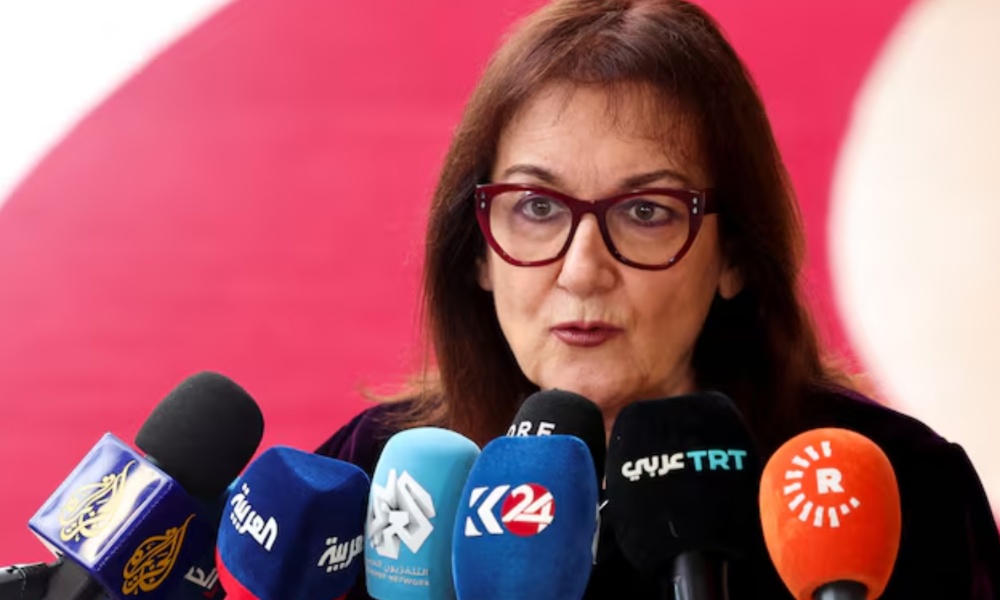
The European Union will increase its financial support for the Palestinian Authority with a three-year package worth around 1.6 billion euros ($1.8 billion), the European Commissioner responsible for the Middle East told Reuters in an interview.
Dubravka Suica, the European Commissioner for the Mediterranean, said the financial support would go hand in hand with reforms of the Palestinian Authority, which has been accused by critics of corruption and bad governance.
“We want them to reform themselves because without reforming, they won’t be strong enough and credible in order to be an interlocutor, not for only for us, but an interlocutor also for Israel,” Suica said.
The commissioner’s remarks came ahead of a first “high-level political dialogue” between European Union foreign ministers and senior Palestinian officials including Prime Minister Mohammad Mustafa in Luxembourg on Monday.
The EU is the biggest donor to the Palestinians and EU officials hope the Palestinian Authority, which runs the West Bank, may also one day take responsibility for Gaza after the war between Israel and Hamas militants comes to an end, Reuters reported.
Israeli Prime Minister Benjamin Netanyahu’s government, however, has so far rejected the idea of handing over Gaza to the PA and shunned the EU’s broader aim of a two-state solution, which would include the establishment of a Palestinian state.
Suica said 620 million euros would go to financial support and reform of the PA, 576 million euros to “resilience and recovery” of the West Bank and Gaza and 400 million euros would come in loans from the European Investment Bank, subject to the approval of its governing body, Reuters reported.
She said average EU support for the PA had amounted to about 400 million euros over the past 12 years.
“We are investing now in a credible manner in the Palestinian Authority,” Suica said.
I think that the United States Steel one of the great companies of the world should remain in our country.
-
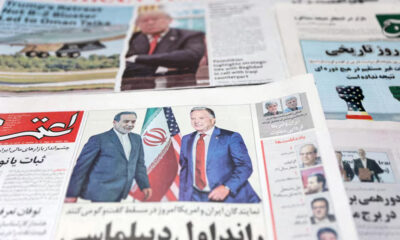
 Regional4 days ago
Regional4 days agoIran, US hold ‘positive’ talks in Oman, agree to resume next week
-
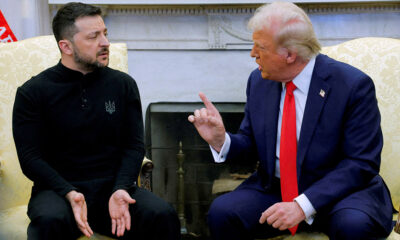
 World4 days ago
World4 days agoTrump says Ukraine talks may be going OK, but there is a time ‘to put up or shut up’
-

 Latest News4 days ago
Latest News4 days agoPakistan’s Punjab CM calls for ‘human response’ to Afghan girls’ education ban
-
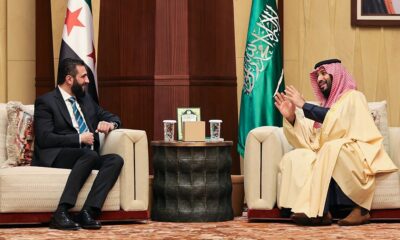
 Regional3 days ago
Regional3 days agoSaudi Arabia plans to pay off Syria’s World Bank debts – Reuters
-
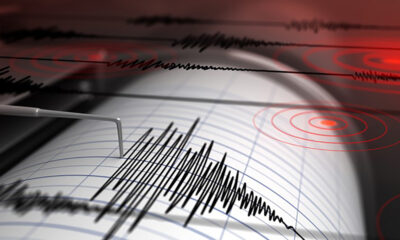
 Latest News4 days ago
Latest News4 days ago6.1-magnitude earthquake shakes northern Afghanistan
-
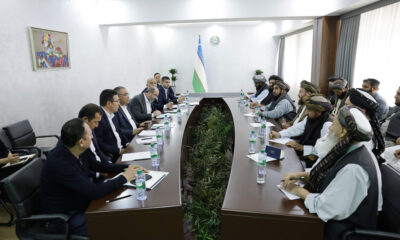
 Latest News3 days ago
Latest News3 days agoAfghanistan and Uzbekistan to expand cooperation in agriculture sector
-
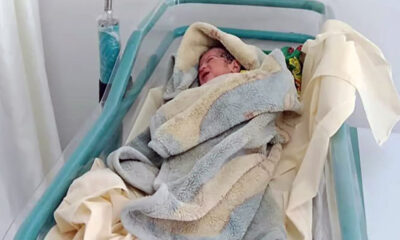
 Latest News2 days ago
Latest News2 days ago17 babies born at Torkham refugee centers in past two weeks
-

 World2 days ago
World2 days agoTrump says Iran must give up dream of nuclear weapon or face harsh response


